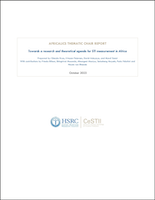The AfricaLics network is part of a global network of scholars who “study the role of innovation and who consider innovation systems as complexes of institutions that mould and support innovation in countries at different levels of industrialization.”[i]
The AfricaLics network starts from this same basis but has a deliberate emphasis on how innovation efforts impact society, not just in terms of economic development or industrialisation but also in terms of social development (with issues of inclusion and sustainability often being the focus of members’ work). The result is that research within the AfricaLics network covers several thematic areas that range from how innovation takes place, how innovation can be promoted and supported and, the impact of innovative efforts on society. Innovation is defined broadly in the AfricaLics network as introducing new things into new contexts and not just as formally defined new or improved products, processes, organisational or business models.
Network member’s research tends to fit into one or more of the main thematic areas or one of the network’s more focused research coordination areas.
Thematic areas
Typically papers presented at our events focused on:
- Systems thinking – using frameworks such as national innovation systems, sectoral innovation systems, technological innovation systems, agricultural/ health innovation systems to understand how enabling the environment for innovation is and the barriers that exist to innovation efforts.
- Innovation management – this work looks at the extent, status or challenges to innovation activity traditionally within formal firm settings. However, increasingly, there is work considering how innovation takes place and can be promoted in different types of organisational structures, including public organisations, the informal sector and households.
- Competencies and learning – this recognises that innovation creates new capabilities, skills and knowledge but also that innovative activity requires certain competencies to be in place to start with. Work here looks at what these competencies and learning are and how they can be promoted and sustained.
- Governance, policy and politics – this thematic area has some similarities to the systems thinking them but differs in that it is focused on the connections and power dynamics within innovation systems but also within firms or other organizational structures conducting or promoting innovation. It is also focused on tacit and explicit rules, laws and norms that influence innovation and innovation policy.
Scholars within the AfricaLics network may focus on one or more of these thematic areas and come at them from a range of disciplines, from economics to social policy, development studies to engineering. They may also study these with a country, sector or industry focus or through a specific cross-cutting lens such as gender or finance.
Research Coordination Areas (RCAs)
Since 2022, the Network has placed additional emphasis on specific areas of research. These are either deemed ‘neglected research areas’ due to the lack of current research taking place or ‘diffuse research areas’ where there is intense activity, but more coordinated efforts are required. In all cases, the interest is to help researchers in the network share knowledge and learning and promote joined-up research projects. A key output from the RCAs is regular ‘state of the art’ reports outlining the latest research findings, gaps and opportunities.
The Network currently has two established RCAs: one on development of STI indicators suitable for African contexts and the other on the intersections between innovation and Global Value Chains. Two more thematic coordinators are in the making (on green transition/energy and agricultural innovation systems, respectively).
The latest state of the art reports are available here
[i] https://www.globelicsnetwork.org/about-globelics/history-and-future/ (accessed 05/09/24)

